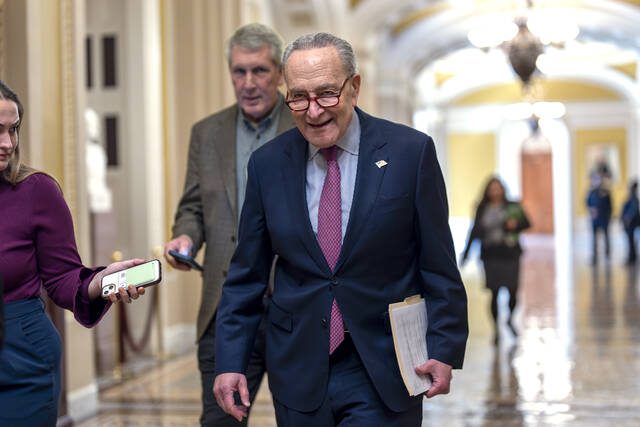WASHINGTON — The Senate on Friday passed a $460 billion package of spending bills just in time for the midnight deadline to avoid a shutdown of many important federal agencies. This vote marks the halfway point for lawmakers in completing their 2024 budget year appropriations work.
The package consists of six annual spending bills and has already been approved by the House. It now awaits President Joe Biden's signature to become law. Simultaneously, lawmakers are in talks about a second set of six bills, including defense, with the aim of fully funding all federal agencies by March 22.
Senate Majority Leader Chuck Schumer, D-NY, stated, "For those concerned that a divided government achieves nothing, this bipartisan package proves otherwise."
He mentioned that the bill's approval would enable the hiring of additional air traffic controllers and rail safety inspectors, provide a pay raise for federal firefighters, and increase support for homeless veterans, among other things.
The Senate approved the bill with a vote of 75-22. The chamber worked hard to reach a final vote just before the midnight deadline for the first round of appropriations bills. Lawmakers aimed to vote on several amendments and wanted to express their opinions on the bill and other priorities during the floor debate. It was uncertain if senators would manage to avoid a brief shutdown, but the bill's eventual approval was never really in question.
"I would urge my colleagues to cease taking unnecessary risks here," said Sen. Susan Collins, the leading Republican member of the Senate Appropriations Committee. "It would be irresponsible for us not to approve these bills and fulfill our primary obligation of funding the government. What could be more important?"
These votes come more than five months into the current fiscal year, after congressional leaders relied on a series of temporary bills to keep federal agencies funded for a few more weeks or months while they struggled to reach an agreement on full-year spending.
Ultimately, total discretionary spending set by Congress is expected to reach around $1.66 trillion for the entire budget year ending on Sept. 30.
Republicans managed to keep non-defense spending relatively stable compared to the previous year. Supporters view this as progress, considering that annual federal deficits exceeding $1 trillion have become common. However, many Republican lawmakers were pushing for much more substantial cuts and policy wins.
The House Freedom Caucus, which comprises numerous conservative GOP members, encouraged Republicans to vote against both the first spending package and the second one currently being negotiated.
Democrats successfully defeated most of the policy riders that Republicans sought to include in the package. They were able to resist an attempt to block new rules that expand access to the abortion pill mifepristone. They also succeeded in fully funding a nutrition program for low-income women, infants, and children, allocating around $7 billion for the WIC program. This marks a $1 billion increase from the previous year.
Republicans were able to achieve some policy wins, however. For instance, one part of the bill will stop the sale of oil in the Strategic Petroleum Reserve to China. Another policy rule prevents the Justice Department from investigating parents who speak freely at local school board meetings.
Another part strengthens gun rights for certain veterans, although opponents say it could make it easier for those with serious mental health conditions like dementia to get a firearm.
Sen. Patty Murray, the Democratic chair of the Senate Appropriations Committee, said, ”This isn’t the package I would have written on my own. But I am proud that we have protected absolutely vital funding that the American people rely on in their daily lives.”
Sen. Rand Paul, R-Ky., expressed concern about the bill, saying there was too much compromise, which led to excessive spending.
“Many people don’t understand this. They believe there is no cooperation in Washington, but the opposite is true. There is compromise every day on every spending bill,” Paul said.
“It’s compromise between big-government Democrats and big-government Republicans,” he added.
However, with a divided Congress and a Democratic-led White House, any bill that doesn’t have support from members of both political parties won’t pass.
The bill also contains over 6,600 projects requested by individual lawmakers costing about $12.7 billion. Some Republican members criticized the projects, although members from both parties broadly participated in requesting them for their states and congressional districts. Paul described the spending as “the grease that eases in billions and trillions of other dollars, because you get people to buy into the total package by giving them a little bit of pork for their town, a little bit of pork for their donors.”
However, an attempt by Sen. Rick Scott, R-Fla, to remove the projects only gained 32 votes with 64 against. Murray said Scott’s effort would overrule “all the hard work, all the input we asked everyone to provide us about projects that would help their constituents.”
Even though lawmakers find themselves passing spending bills five months into the fiscal year, Republicans are framing the process as improved nevertheless because they broke the cycle of passing all the spending bills in one massive package that lawmakers have little time to study before being asked to vote on it or risk a government shutdown. Still, others said that breaking up funding into two chunks of legislation war hardly a breakthrough.
The first package now making its way to Biden’s desk covers the departments of Justice, Veterans Affairs, Agriculture, Interior and Transportation, among others.



